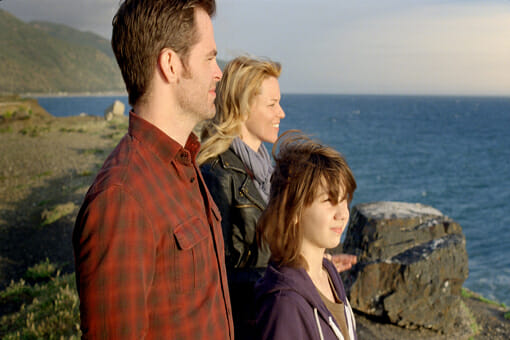By Brock Wilbur · July 3, 2012

Sigh.
You guys, I don't mean to sound like a genius or some kind of mad prophet sent from the future, but were you aware that "family," as a concept, is all you need? That it is like, I don't know, a good thing? Wait, you came around to my side of the argument super quick there. Had you heard this idea before? Oh, in every other movie you'd ever seen, especially Jurassic Park?
Then why would we need a film in 2012 that had nothing to say except: "Family: Good. Fire: Bad."
People Like Us follows a fast talking sales guru (Chris Pine) who takes his overly supportive girlfriend (Olivia Wilde) back to his family home over in California to deal with a death in the family. After missing his father's funeral, they shack up with his mom (Michelle Pfiffer) who breaks from doing her best Joni Mitchell impression long enough to slap Chris Pine around. Pine, through an intermediary, is given several hundred thousand dollars in cash from his father's settlement, but is also told the money is meant for someone else. Through sketchy research, he determines it is intended for a mop-haired teenager with a bad attitude, who lives with his ex-coke-head single working mom (Elizabeth Banks), who is his long lost sister.
If it sounds like we're dealing with some of the same characters and narrative devices as Little Miss Sunshine, you'd be annoyingly observant. Also, sounds like you should maybe start writing these, if you're going to jump the gun like that. It does seem like this film aims for that level of "indie-quirk", but just like last weeks Seeking A Friend For The End Of The World, it applies said formula to the first 30 minutes, and then shifts into a more serious tone throughout, forgetting what it seemed to once recognize as "fun." The departure of that joy literally coincides with the departure of Olivia Wilde, who goes from wide-eyed fire-cracker to suddenly angry enough to head to the airport over a minor fight. By the time Pine enters a weird fury-bender in the next scene, it doesn't ellict nearly the laughs smaller moments could satisfy five minutes earlier, because we've shifted tone so completely. This is a movie where a teenage boy blows up a pool as his entrance. Why can't we have more of that?
Instead, the next hour winds up being that infuriating trope where the main character has a very obvious secret to share, and a billion great reasons to share it, but keeps his mouth shut opportunity-to-opportunity, simply to forward the plot. It. Is. Maddening. Friends, warn me when we're headed into another of these You've Got Mail scenarios, cause I refuse to sit through another.
What makes this SO MUCH WORSE is Pine's interest in discovering more about the secret family leads him to interject himself into their lives (showing up at AA meetings and picking the kid up from school), complimenting them on their strength and throwing money at their problems, but never identifying his interest in their lives or supplying even false motivation. The product becomes, as the kid identifies, that of a stalker or pedophile relationship. But it doesn't stop there. Elizabeth Bank's character has encountered the first nice guy of her life, with bonus invested interest in her son, which sends the Banks/Pine scenes into the realm of romantic comedy.
Yeah. A big portion of this movie is about pulling on your heart strings while watching a brother and sister unknowingly flirt. Nora Ephron, without you in our lives we've had to turn to incest. You are greatly missed.
To be clear: If this was a movie about accidentally falling in love with your sister, and having to make a choice between telling her or being happy, or if at the very least they'd allowed the main character to suffer this internal debate, it would be ten thousand times more interesting.
But the writing/directing team of Alex Kurtzman and Robert Orci wouldn't have spent eight years on this film just to churn out a weirdly pointless family drama. The whole narrative is wrapped in a story of rock'n'roll history, vinyl record collecting, and love for various Los Angeles locations like the Troubadour and the Standard. It's hard to pick on a movie where the lead educates his new nephew on bands like Television and makes jokes about Faith No More lyrics, but it also marks the second film this year (This Means War) where Pine has been randomly placed in a shop to prove his love interest status by informing another character of his superior cultural tastes. Can we all stop trying to play Tarantino for a bit?
Banks is stellar in her role and Pfiffer does a great glassy-eyed grandmother with secret rage, and we even get a little smattering of Mark Duplass for some reason, but none of it is enough to save People Like Us from being little more than a high budget Hallmark movie. The characters can be dirty or complicated for stretches that betray a better movie underneath, but the last half-hour devastates all hope with a non-stop Nicholas Sparksian parade of over-sincere monologues and "realizations" where no one on screen can stop crying, except for when they are laughing at their own crying.
We're doing neither.